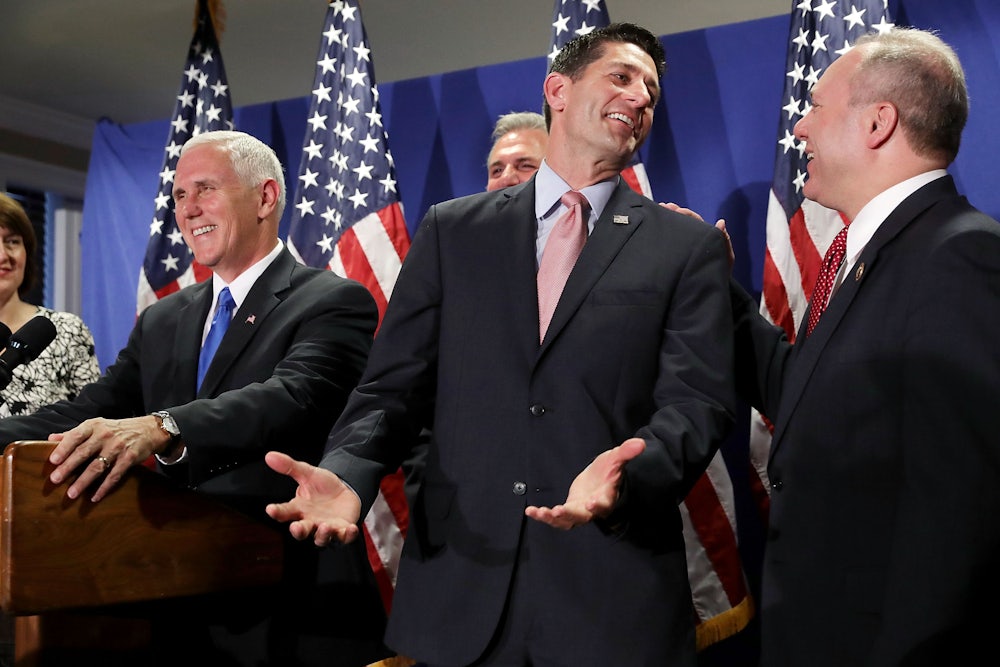Donald Trump did a lot of damage to the organs of democracy as a presidential candidate, and the pace and severity of that vandalism has only increased since he won.
After he became president-elect, his international business empire was transformed from an under-discussed source of potential graft to an enormous, real-and-ongoing one that could shape both foreign and domestic policy in ways that run contrary to American interests.
On Sunday evening, perhaps to clutter front pages and news programs with something other than his administration’s pre-inaugural corruption, he peddled the outrageous lie that he is the rightful winner of the national popular vote (which he will lose by well over two million ballots) but has been denied by ubiquitous fraud.
In between, he announced that an erratic conspiracy theorist will be his most powerful national security aide, and that another somewhat less erratic conspiracy theorist will be the first erratic conspiracy theorist’s deputy. Trump’s administration-in-waiting spent much of the Thanksgiving holiday weekend undertaking a kind of ritual humiliation of Mitt Romney, who emerged at least for a time as a top contender to run the State Department. These surrogates spread word that Romney—once a fierce Trump critic—may be required to publicly apologize for his earlier disloyalty, then used TV appearances and social media to claim that nominating Romney would be an act of betrayal.
There are only two weathered institutions—Congress and the media—with the tools and clout required to draw scrutiny to these and other dangers, but only Congress has the power to actually curtail them.
With almost no exceptions, Republicans on Capitol Hill have ignored all of this—not because they aren’t alarmed, but because they’ve decided that acting to constrain Trump now would be inconvenient. Trump is effectively testing, increment by increment, how much damage to democracy Republicans will tolerate in pursuit of right-wing ideological goals. We are watching that test play out in real time, and the only question now is whether the GOP’s gamble will pay off, or fail catastrophically before they have a chance to accomplish anything.
There are multiple incentives inhibiting Republicans from acting to contain Trump right now. Trump is more popular among GOP voters than many elected Republicans are within their own states and districts. Those who might otherwise be inclined to rein Trump in might also be disinclined to sow division within the party before they’ve even claimed their new majority.
But the zen mantra on Capitol Hill isn’t about Trump or party unity per se, but the regressive tax cuts and restored Supreme Court dominance his victory portends. Republicans have led the country into a terrifying funhouse, but are taking solace in the faith that everyone will emerge from it unscathed after they’ve secured their election spoils.
As the cavalcade of disgraces accelerates, this bet looks more and more reckless. Republicans may never find it within themselves to treat Trump’s embarrassments and corruption with the alarm they deserve, but they are almost certainly not going to rein him in before he sends them an acceptably Scalia-like Supreme Court nominee and signs their tax cuts.
These processes could take weeks or months, though. The scope of damage a corrupt, retributive, erratic president could do with weeks or months of unfettered power—unconstrained by any meaningful legislative check—is nausea-inducing. He could secure what amount to bribes from foreign and domestic leaders in exchange for favorable policy or regulatory treatment. He could gut the civil service. He could start a war.
It would only require a small handful of GOP senators to effectively contain Trump. Without 50 reliable votes in the Senate, Trump can’t pass legislation or staff his administration. A dedicated group of Republican senators could essentially dictate to Trump who is fit to run the government and who isn’t, whether they’ve been loyal to him or not. They could force him to disclose his tax returns, either with legislation or by obstructing his agenda until he disclosed them voluntarily. If GOP committee chairmen refuse to investigate the commingling of Trump’s business interests and his governing decisions, they could make his presidency a dead letter until Trump liquidated his properties and placed the proceeds into a genuinely blind trust.
It is unlikely any Republicans will go that far, but it is possible to imagine a few will take meaningful steps to prevent Trump from making the most mortal of errors. Just not until they take care of family business first. To the extent that three or more GOP senators realize how risky their party’s head-in-the-sand strategy is, it stands to reason they will feel motivated to expedite a few meaningful GOP agenda items, so that they can assert themselves in a stabilizing way—ideally before U.S. democracy is damaged irretrievably.
The race is on.
